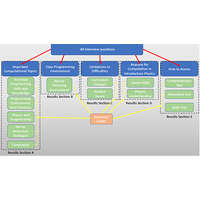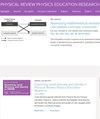分析针对物理入门学生的计算思维访谈:实现通用评估
IF 3.6
2区 教育学
Q1 EDUCATION & EDUCATIONAL RESEARCH
Physical Review Physics Education Research
Pub Date : 2024-04-26
DOI:10.1103/physrevphyseducres.20.010128
引用次数: 0
摘要
物理学中的计算思维有许多不同的形式、定义和实现方式,这取决于物理学的水平或其呈现的机构。为了更好地将计算思维融入物理入门课程,我们需要了解物理学家认为计算思维在物理入门课程中的重要性。我们对学术物理学家(N_a=18)和工业物理学家(N_i=8)就物理入门课程中计算思维的教与学进行的26次访谈进行了定性分析。这些访谈是开发物理入门计算思维评估协议的长期项目的一部分。我们发现,学术界和工业界的物理学家都很重视学生阅读代码的能力,而 python(或 vpython)和电子表格是他们首选的计算语言或环境。此外,受访者还提到,识别程序中的核心物理概念、向他人解释代码以及良好的程序卫生(即注释和使用有意义的变量名)是入门学生需要掌握的重要技能。我们还发现,虽然少数受访者指出,从计算中获得的经验和技能对学生未来的职业生涯非常有用,但他们也描述了在物理入门教学中教授计算的多种限制因素,如课程大修、没有 "空间 "进行计算以及学生排斥等。访谈结果表明,虽然将计算思维纳入物理学生的学习范围很重要,但真正的重要性来自于利用计算思维更好地学习和理解物理。这告诉我们,我们开发的评估只应包括评估物理入门知识所需的基本计算思维。本文章由计算机程序翻译,如有差异,请以英文原文为准。

Analyzing interviews on computational thinking for introductory physics students: Toward a generalized assessment
Computational thinking in physics has many different forms, definitions, and implementations depending on the level of physics or the institution it is presented in. To better integrate computational thinking in introductory physics, we need to understand what physicists find important about computational thinking in introductory physics. We present a qualitative analysis of 26 interviews asking academic () and industrial () physicists about the teaching and learning of computational thinking in introductory physics courses. These interviews are part of a long-term project toward developing an assessment protocol for computational thinking in introductory physics. We find that academic and industrial physicists value students’ ability to read code and that python (or vpython) and spreadsheets were the preferred computational language or environment used. Additionally, the interviewees mentioned that identifying the core physics concepts within a program, explaining code to others, and good program hygiene (i.e., commenting and using meaningful variable names) are important skills for introductory students to acquire. We also find that while a handful of interviewees note that the experience and skills gained from computation are quite useful for student’s future careers, they also describe multiple limiting factors of teaching computation in introductory physics, such as curricular overhaul, not having “space” for computation’, and student rejection. The interviews show that while adding computational thinking to physics students’ repertoire is important, the importance really comes from using computational thinking to learn and understand physics better. This informs us that the assessment we develop should only include the basics of computational thinking needed to assess introductory physics knowledge.
求助全文
通过发布文献求助,成功后即可免费获取论文全文。
去求助
来源期刊

Physical Review Physics Education Research
Social Sciences-Education
CiteScore
5.70
自引率
41.90%
发文量
84
审稿时长
32 weeks
期刊介绍:
PRPER covers all educational levels, from elementary through graduate education. All topics in experimental and theoretical physics education research are accepted, including, but not limited to:
Educational policy
Instructional strategies, and materials development
Research methodology
Epistemology, attitudes, and beliefs
Learning environment
Scientific reasoning and problem solving
Diversity and inclusion
Learning theory
Student participation
Faculty and teacher professional development
 求助内容:
求助内容: 应助结果提醒方式:
应助结果提醒方式:


